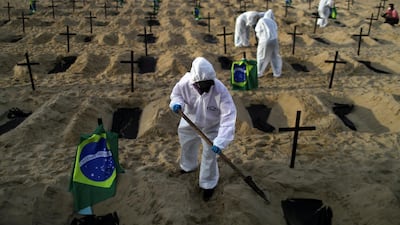Since the onset of the coronavirus pandemic in December last year, a total of one million people have died because of Covid-19.
A few months ago, it seemed there was hope of avoiding this tragic milestone. As late as April, some world leaders were hopeful that the virus would die out with the summer, and that the pandemic would be past us within months.
Yet until this day, even as hopes for an effective and widely available vaccine remain high, the best means of protecting one another from disease still lies in taking individual and communal precautions. These include washing hands frequently, wearing a face covering, practising physical distancing and limiting gatherings to small numbers.
Breaking those simple rules can endanger lives. It is also a sign of disrespect for the pain of millions of people who have lost a loved one to Covid-19 complications, and for patients who are still suffering from the disease.
Mass-testing campaigns have also proven to be effective in locating and treating coronavirus clusters, and preventing their spread. The UAE has carried out one of the highest numbers of tests per capita in the world, a strategy that has helped to keep the pandemic under control despite a rise in cases in the past few weeks.
The disease has been diagnosed in more than 33 million so far. Cases are rising in many parts of the world – notably in the US, India and Brazil, which comprise more than half of all Covid-19 cases worldwide.
The real numbers of Covid-19 cases and deaths are believed to be even higher, as many countries do not have access to the necessary equipment to carry out the tests.
It is often the most fragile segments of society that are most affected by the consequences of Covid-19. The elderly, people with existing health conditions and those who simply do not have the financial means to work from home or to follow basic hygiene and physical distancing measures to protect themselves, are greatly affected. We must all work towards supporting those most vulnerable.
There have been many heroes in this battle against Covid-19, especially frontline workers taking great risks to treat others. According to data from Amnesty International, at least 7,000 frontline workers have lost their lives to coronavirus infection.
Earlier this month, the UAE announced it had allowed the emergency use of a Covid-19 vaccine, which is still undergoing last-phase trials, for frontline healthcare workers. The Emirates also identified 80,000 frontline medical staff, who will be awarded professional, psychological and financial support in recognition for their lifesaving work.
Remembering the sacrifices of those keeping us healthy, while honouring those who have died means that we must all take responsible measures as the pandemic is far from over.


